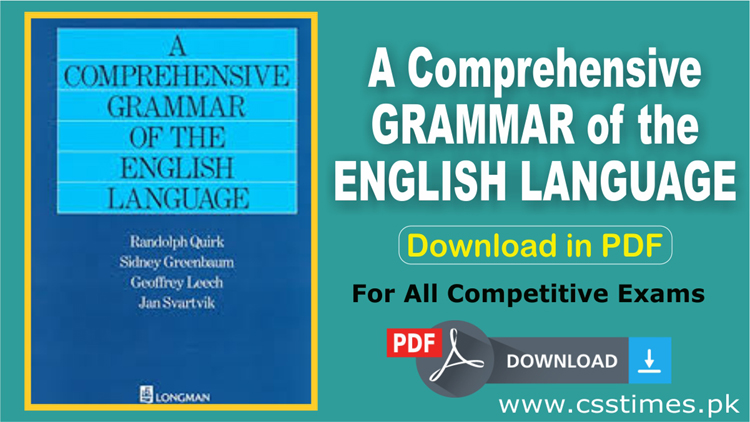A Comprehensive GRAMMAR of the ENGLISH LANGUAGE Download Free in PDF for CSS / PMS and all related competitive Exams preparation.
The book “A Comprehensive GRAMMAR of the ENGLISH LANGUAGE” is Indeed comprehensive and unquestionably not for first reading. But it is attractively written and expressions interesting. A truly remarkable book dealing key areas in grammar, a must read for every aspirant of the English Language.
Reviewed by John Algeo (University of Georgia)
A Comprehensive Grammar of the English Language is the best and most complete description yet made of present-da English morphology and syntax. Its title, to be sure, is the modern equivalent of the Anglo-Saxon beot-a formal and ritualistic boast by a warrior, detailing his prowess and the feats he intends to perform. For the warrior to fail to realize a boast once made was to turn it into mere vainglorious boasting. But to fulfill a promise delivered before the hearth-companions was to gain an immortal name for oneself in the songs of the scoops. The boast f this book’s title is fulfilled in the pages of what is, indeed, the most comprehensive grammar we hve for English.
Check also: 101 Essays That Will Change The Way You Think (Download in PDF)
No grammar, to be sure, can include all the details of the structure of a language, just as no dictionary can include all the words in a language. “Comprehensive” is not “complete”. But it does mean inclusive rather than exclusive and implies a broad grasp of reality. In that sense, the Comprehensive deserves its name.
This book is a sequel to, rather than revision of, the authors’ earlier work, A Grammar of Contemporary English (1972). The new book is considerably larger and more thorough than the earlier one, large and thorough though the old book was. Moreover, although the new book preserves the same basic approach to grammatical description as its predecessor, t he details have often been reanalyzed. Indeed, the authors re devised primary responsibility in this sequel, so that all the material has had a fresh approach to it.
he authors have drawn upon the insights of grammarians of all schools, but have limited themselves to the doctrinaire restriction of none. The result is a grammar that might be appropriately called new traditional. To read it requires no imitation into the special formalism and argon of any theoretical school.
